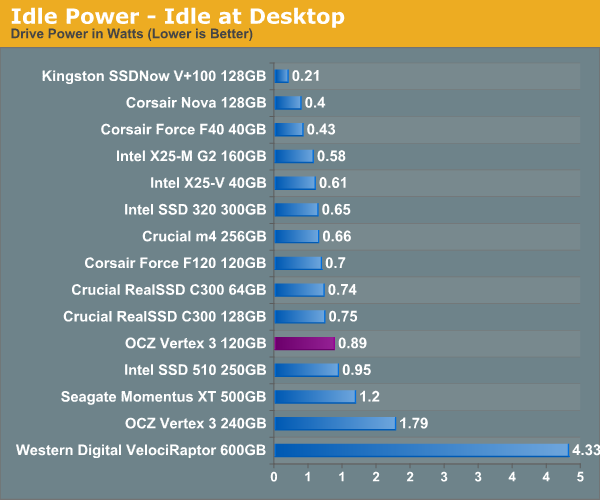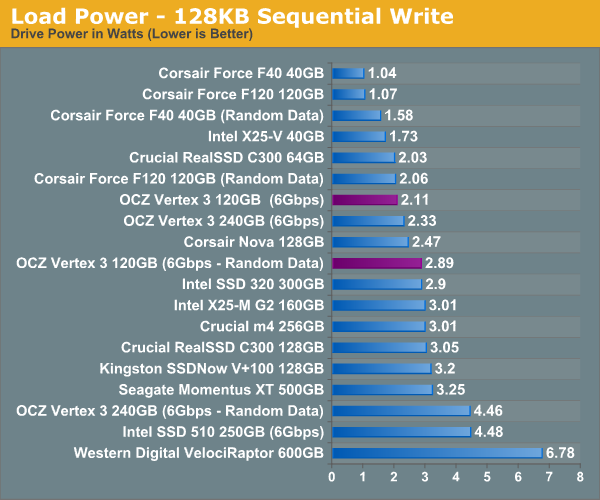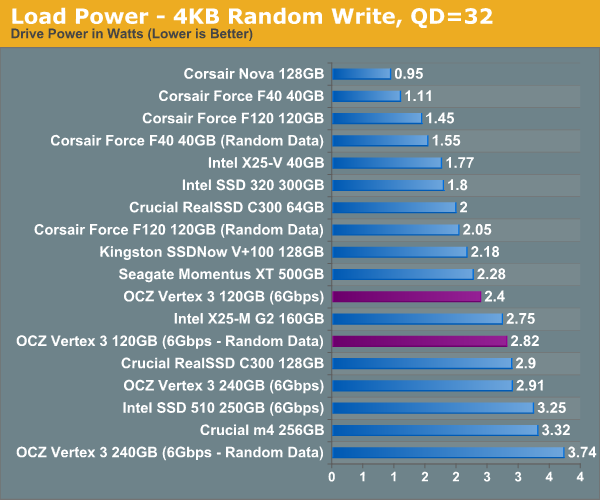The OCZ Vertex 3 Review (120GB)
by Anand Lal Shimpi on April 6, 2011 6:32 PM ESTTRIM Performance
In our Vertex 3 preview I mentioned a bug/performance condition/funnythingthathappens with SF-1200 based drives. If you write incompressible data to all LBAs on the drive (e.g. fill the drive up with H.264 videos) and fill the spare area with incompressible data (do it again without TRIMing the drive) you'll actually put your SF-1200 based SSD into a performance condition that it can't TRIM its way out of. Completely TRIM the drive and you'll notice that while compressible writes are nice and speedy, incompressible writes happen at a max of 70 - 80MB/s. In our Vertex 3 Pro preview I mentioned that it seemed as if SandForce had nearly fixed the issue. The worst I ever recorded performance on the 240GB drive after my aforementioned fill procedure was 198MB/s - a pretty healthy level.
The 120GB drive doesn't mask the drop nearly as well. The same process I described above drops performance to the 100 - 130MB/s range. This is better than what we saw with the Vertex 2, but still a valid concern if you plan on storing/manipulating a lot of highly compressed data (e.g. H.264 video) on your SSD.
The other major change since the preview? The 120GB drive can definitely get into a pretty fragmented state (again only if you pepper it with incompressible data). I filled the drive with incompressible data, ran a 4KB (100% LBA space, QD32) random write test with incompressible data for 20 minutes, and then ran AS-SSD (another incompressible data test) to see how low performance could get:
| OCZ Vertex 3 120GB - Resiliency - AS SSD Sequential Write Speed - 6Gbps | |||||
| Clean | After Torture | After TRIM | |||
| OCZ Vertex 3 120GB | 162.1 MB/s | 38.3 MB/s | 101.5 MB/s | ||
Note that the Vertex 3 does recover pretty well after you write to it sequentially. A second AS-SSD pass shot performance up to 132MB/s. As I mentioned above, after TRIMing the whole drive I saw performance in the 100 - 130MB/s range.
This is truly the worst case scenario for any SF based drive. Unless you deal in a lot of truly random data or plan on storing/manipulating a lot of highly compressed files (e.g. compressed JPEGs, H.264 videos, etc...), I wouldn't be too concerned about this worst-case scenario performance. What does bother me however is how much lower the 120GB drive's worst case is vs. the 240GB.
Power Consumption
Unusually high idle power consumption was a bug in the early Vertex 3 firmware - that seems to have been fixed with the latest firmware revision. Overall power consumption seems pretty good for the 120GB drive, it's in line with other current generation SSDs we've seen although we admittedly haven't tested many similar capacity drives this year yet.













153 Comments
View All Comments
martixy - Monday, April 11, 2011 - link
So... the SSD market is shaping up to the just about the most confusing and volatile market out there.At least that's the impression I get from the articles here. I mean you'd probably need your very own market research team if you want to get a good deal on an SSD.
Meh...
gixxer - Monday, April 11, 2011 - link
So if you have read all the comments up to this point with the OCZ verus Intel debate.Where would you spend your money?
A vertex 3, Intel 320, or Intel 510
MamiyaOtaru - Tuesday, April 12, 2011 - link
it's not scientific, but after looking at the newegg user review averages, not touching anything other than inteltech6 - Monday, April 11, 2011 - link
Thank you Anand - you're a real asset to the tech community!While OCZ has a potentially great product, they are really proving to be their own worst enemy. Until they demonstrate some maturity I will choose an Intel 320 instead. It may not be the newest or fastest but the G1/G2/G3 series drives have so far proven to be reasonably reliable and perform as advertised.
ClagMaster - Monday, April 11, 2011 - link
Seems to me the Intel 510 offers better mainstream performance than the Vertex 3.And I also think Intel does a better job with balancing firmware with memory technology, and has better configuration control of what memory is used for their SSD's.
I think suffering a 20% risk of getting a Vertex 3 SSD with slower memory is too high for what I pay for such a device
qax - Wednesday, April 13, 2011 - link
This sort of commitment can make me wanna buy OCZ next time, thats for sure.Although they shipped slow drives, they accept the responsability, and thats a big thing in my world.
I´ve totaly stopped buying som vendors that are too cheap, resulting in useless/nonexisting support.
Same reason why i allways buy from a psysical shop and never from internetshops.
I need psysical adress not too far from my own adress, where i can turn in a faulty product.
For me an SSD driver will allways be used for OS, programs and games. For space i would have HDD.
So space on SSD is no concern.
javishd - Wednesday, April 13, 2011 - link
I think I'm not alone here. Waiting to buy after some real comparisons of the $300 120gb range. We look to you for help with the decision! Thanks for your long term commitment to ssd. I've been on board since the x25 g1, and I really appreciate all the info from you guys. I'll keep checking every day hoping....alexb1 - Wednesday, April 13, 2011 - link
Anand, THANK YOU VERY VERY MUCH!Honestly, there is NO ONE ELSE in the IT industry advocating for enthusiast consumers like you... kudos!
I am A VICTIM of OCZ Marketing of Vertex2, and got a 80GB recently that basically does EXTREMELY POOR compared to ALL benchmarks. To top it all off, it is NOT part of the *recall* drives as its size hasn't been affected with the 25nm transition... so I am just about to return and take a 15% restocking fee.
Now, my question is... should I even bother looking for a 34nm drive, or one of the newer 25nm drives would just do ok as boot drive in Win7? My MOST CONCERN is reliability and longevity.
I can either get a F60-A (25nm), F60 (34nm), or OCZ Vertex2 (25nm)... The 25nm being $30-40 CHEAPER!
faster - Thursday, April 14, 2011 - link
Today the Intel 510 250GB drive mentioned in these benchamarks can be had at newegg for $615 (-$40 off promo until 4/19, $575).The Egg also has the Revo Drive X2 240GB at $570 (was $680).
So we as consumers have the new 250 GB 6Gbps SATA3 SSD drives vs. the 240GB PCIE X4 integrated bootable RAID 0 card within $5 of the same price point.
Certainly a bootable add in card is not a straight comparison to a single SSD drive, but at the same price point, in the cutting edge overpriced enthusiast level, it is a sensible comparison.
Anandtech should put the RevoX2 in these benchmark charts to show how they measure up. It would be more interesting than comparing a WD Raptor represented by tiny slivers on the performance comparisons. I believe, generally speaking, that the Revo would come away with faster read speeds and be neck in neck with fastest SSD drives on write speeds. AnandTech had or has a RevoDrive that they reviewed in the past. Is that thing still laying around?
daidaloss - Thursday, April 14, 2011 - link
@fasterI second your petition to Anand to put the Revo2 on the charts, so us, real power user, would have an idea how do SSDs compare with PCI raid cards.
Also, sure would be interesting to see how do SSD compare to ram drives like the HyperDrive5. Supposedly this thing boots up in 4 seconds. Should be interesting to compare such a system with a modern SSD.